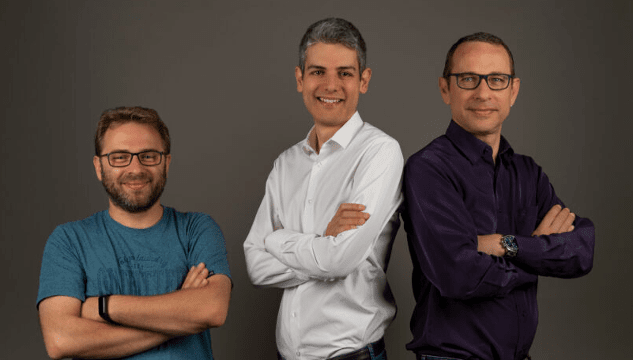French startup Biomemory has raised €5 million in seed funding to advance its technology developed to store data on DNA.
14/12/2022
French startup Biomemory has raised €5 million in seed funding to advance its technology developed to store data on DNA. It is intended to replace traditional data centres, which have an enormous carbon footprint.
- Biomemory is developing a DNA synthesis and copy process based on synthetic biology to store data.
- The technology is intended to replace traditional data centres, which require massive amounts of water and energy to function to the detriment of the environment.
- Scientists have been trying to store data on DNA for decades, but it has so far presented several challenges.
Why do we need to store data on DNA?
The world’s data is currently stored in dedicated centres but they have a significant environmental impact. They are extremely energy-intensive and account for 3% of the global electric supply: according to the Massachusetts Institute of Technology (MIT), a single centre can consume as much electricity as 50,000 homes.
The carbon footprint of the cloud computing industry is similar to aviation. The electricity consumed by data centres accounts for 0.3% of total annual carbon emissions, but this number rises to 2% when including networked devices such as laptops, smartphones and tablets.
As well as consuming significant amounts of electricity to run, data centres are among the top-ten water-consuming industries in the US, as water is being used to cool the servers. Another environmental impact is the e-waste resulting from replacing and disposing of the equipment.
Around 60% of the data generated today is stored on magnetic tapes. Their global market is nearly $6.5 billion per year, and it is expected to grow to over $40 billion by 2030 as demand rockets.
As the amount of data being generated, and therefore needing to be stored, grows exponentially, the cloud computing industry will continue to expand. Finding solutions to reduce its environmental impact, which includes storing data on bio-based technology, is imperative.
DNA presents a compelling solution as it does not require energy or water to function and can be stored in relatively simple conditions. It is also much denser than other types of storage – one gram can host 215 petabytes of data, which is equivalent to 215 million gigabytes. Data centres using DNA storage would be much smaller than the ones commonly used.
What does Biomemory do?
Biomemory was founded in 2021 with the ambition to address the environmental impact caused by data centres. It is developing a petrol-free DNA synthesis and copy process based on synthetic biology, exploiting the nature’s way of storing biological information. Its technologies are intended to support the production of long, bio-sourced, biocompatible and bio-secure DNA fragments that can be stored as inert polymers without any energy input.
It claims to have developed a digital media capable of storing data with much greater density than any solid-state drive or magnetic tape – the technologies currently used in data centres. It converts biomass into data, assembling the so-called DNA DRIVE from bio-sourced components. This means that the storage is stable at ambient temperature, does not need energy to run and does not generate CO2 emission.
The funding round was led by eureKARE and the French Tech Seed Fund, managed by Bpifrance, with the support of Paris Business Angels, Prunay Impact and existing investors in Biomemory. The money will be used to optimise the startup’s technology and lower costs.
Current DNA synthesis solutions used for medical and academic research applications cost $1 per kilobyte, while Biomemory believes it can drive down this cost to $1 per megabyte. Further scaling is expected to reach costs of $1 per terabyte, much lower than the current 10-year cost of $17 per terabyte for traditional data centres.
The challenges of storing data on DNA
Scientists have been looking at the potential of storing data on DNA for decades. The idea was first introduced by physicist Richard P. Feynman in 1959, and has been since explored by various universities and companies.
The technology has not been cracked yet due to various challenges, the main one being elevated costs of development. Moreover, retrieving the data is a much slower process compared to commonly used hardware, so it is currently useful for data that needs to be accessed infrequently.
Another issue is identifying the right strands of DNA to access the information needed, and how to remove them without damaging other strands. Several studies, such as the one published by researchers at North Carolina State University in 2019 and another carried out by the MIT in 2021, have developed systems to identify and protect the strands.
The recent research and the funding raised by Biomemory suggests that interest in the technology is not waning – in fact, the reasons to scale it are becoming more compelling as demand for data storage continues to grow, alongside their environmental impact.
Alexandre Mouradian, chairman, founder, and chief executive of eureKARE, concluded: “With close to 30 zettabytes generated annually, it is clear that data storage is a major challenge for our generation, and the market demand for data storage solutions is growing fast. We are pleased to be investing in novel, sustainable and low-cost DNA data storage approaches that aim to fill this gap in the market by revolutionizing how we store data.”
ESSEC Business Angels and its partner Paris Business Angels have invested in this promising start-up.

Commentaires0
Veuillez vous connecter pour lire ou ajouter un commentaire
Articles suggérés


